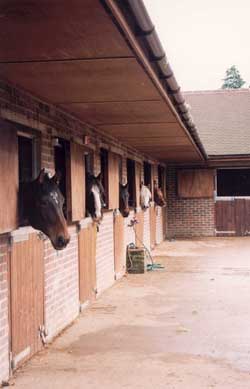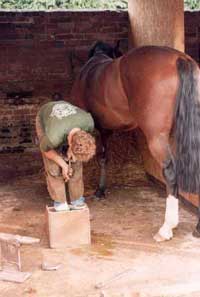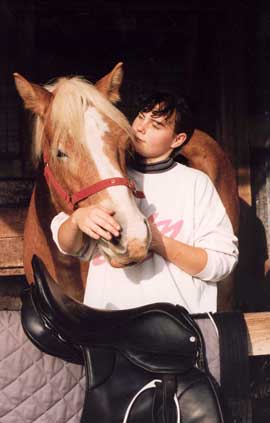

Horse
Studies
CANTERBURY COLLEGE
DIVISION OF GENERAL EDUCATION/COMMUNITY SERVICES
SCIENCE
AND LAND BASED STUDIES
PROGRAMME AREA.
Welcome
to Canterbury College, in particular the equine studies department.
This leaflet is designed to give you a flavour of what is offered
in the equine studies.

My
name is Justin White and I am currently head of the equine studies
department.
Canterbury
College has recently introduced a new equine course, to run
in conjunction with two others, which are already in place.
The College is now offering these integrated courses in partnership
with two professional Equestrian-training yards in order to
provide not only the highest calibre training, but also to give
the student experience of the widest range of career opportunities
within the Equine industry.
If we are successful then next year we are hoping to expand
the range of courses on offer by adding the National Diploma.
The
courses consist of a mixture of theory and practical, with the
practical being held at two yards off campus (see above), although
we are hoping to add two more for next year to cope with students
being located over various parts of the county. This will address
one of the major complaints, which is travelling, and flexibility
of hours worked as many students work part time now.
The
yards that the college uses have full B.H.S.I. instructors.
Both of who are very experienced and offer superb training to
enthusiastic students.
One
is at Goodnestone (Alex Bones) pictured right, and the other
is on Sheppy (Mrs. Haylor).
The
flexibility of this course structure allows students to follow
one of two routes. The more academic path, by studying for the
First or National Diplomas in Horse studies, or if they wish
to follow a more practical route by studying for the City &
Guilds N.V.Qís in Horse Care and Management at all levels.
These
two routes are complemented by participating in the BHS exam
system, training students up-to Assistant Instructor level and
then if they wish, to continue their training on to the Intermediate
Instructor exam, both of which are highly regarded within the
equine industry
.
At Canterbury
College we feel it is important to offer what our students want
to study, but also what employers want in their employees.
To
ensure this, the courses can be taken individually or together
in one package, and by building this flexibility into the course
allows us to tailor the course to meet each individualís requirements
and needs.
By
asking them at the beginning of the course what interests them,
we are able to then incorporate this into the program. I have
found by asking the students to take more responsibility in
the structure of the course, and becoming more actively involved
that they are performing better. It encourages them to have
ideas and contribute to the course more.
All
the tutors and instructors have worked extensively within the
equine industry, and are well able to give the students both
the theory and the practical skills they will need to survive
in the equine industry. Letís not kid ourselves it is a hard
job, and requires dedication.
This
is one of the reasons I have developed the course in its present
format, in order to address two main problems.
- The biggest
problem within the Equine industry has been one of retention
of experienced staff. The course tryís to address this issue
by exposing the student to as wide a range of career options
as is possible. This is done by sending the students on to
a real working yard, which is actually run as a business to
the public, as opposed to a training yard.
This essential
practical experience is supported by college based tutorials,
which include a comprehensive range of additional activities,
including, educational visits (local, national and international),
guest speakers on a wide range of topics e.g. veterinary nursing,
horse welfare, holistic therapy and professional demonstrations.
- The second
biggest problem is one of low pay. By introducing the students
to a large variety of skills and careers, both within the
industry, but also on the support side the students are able
to see that a good career is possible in the horse industry.
| |
First
and National Diploma
The first diploma and the national diploma consist of
a number of separate units; each unit passed will give the
student marks of which they need to attain a certain number
in order to pass the course.
The units are a mixture of practical and theory and cover
such diverse topics as evolution and behavior, riding and
handling of horses in the First Diploma.
The national Diploma then starts to specialize with units
on;
Rehabilitation
of the injured horse.
Driving.
Heavy
horseís.
Business management to name but a few.
|
When the students are in the college they will mainly be doing
the theory, for the horse courses, but there will be a number
of guest speakers, such as the vet from Redwings Animal sanctuary
below left.
|
| |
|
The
course also includes visits to centers such as Redwings, where
the college adopted a Shetland pony called Harry Potter, seen
here with some of the students that adopted him. The college
was also given a tour of the facilities including the superb
operating theatre seen right.
The course places great emphasis on teaching students what
is available to them beyond just riding, teaching, or grooming.
|
|
 |
So
a lot of the speakers will be invited in not just to talk
about horses, but also to talk about themselves, and what
there job involves. They will also be explaining
How
to enter their particular professions and I am pleased to
say that we are having people come and talk to the students
who are;
- Nutritionists.
- Farriers.
- Vets.
- Physiotherapists.
- Equine
Welfare.
This
is to name but a few.
|
There will also be practical demonstrations by visitors and
the students will be encouraged to have a go, under expert
supervision.
When the students are on the yards they will be taught a range
of practical skills
. |
| They
will also be taught the theory on the yard to back these practical
skills up in a well-equipped lecture room |
|
 |
Entry
requirements.
The
first Diploma is open to anyone and is a great taster course
for anyone who is not sure about a career with horses, but
would like a go. It is suitable for the novice rider or for
more experienced riders wishing to acquire some greater knowledge
about horses.
The National Diploma is a more specialized course, which covers
specific elements in greater depth, students can take specific
units and acquire different qualifications by doing this,
for example The National Diploma in Horse Management (Equine),
or the The National Diploma in Horse Management (Equine).
|
I hope this has been a helpful insight into the horse courses
offered at Canterbury College and if you have any more questions
do not hesitate to get in contact with me on the following number:-
01227
811111 ext 1249
Or write to me at:-
Canterbury College
New Dover Rd
Canterbury
Kent
CT1 3AJ
|
|